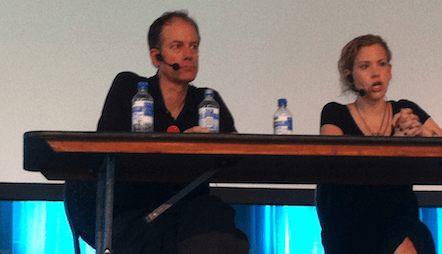Integrity in Intelligence
August 02, 2013
on
on

Intelligence gathering and whistleblowing are hot topics on OHM2013, the biggest outdoor hacker festival in Europe . The programmers, security experts and activists gathered on a field 40 kilometers North of Amsterdam discuss the state of the Internet as the Snowden disclosures continue to expose the unparalleled vastness of signal intercepts.
In a time when the intelligence community seeks total informational awareness whilst at the same time operating in obscurity without proper democratic oversight, whistleblowers become essential to provide the public with information about the programs and systems in place.
Thomas Drake, a former senior executive at the National Security Agency who blew the whistle on secret unlawful surveillance programs in 2001 said in a panel discussion: "The intelligence community is pathologically obsessed with knowing the entire Internet and other signals. It is a pathology, a complex. [They feel that if they] don’t have it all something is missing." Gathering and retaining the data of everybody gives the state an enormous amount of control over citizens. If, for any reason, someone becomes a person of interest, a profile can be instantly called up with the click of a mouse based on data going back for years. Drake: "You don’t get to chose what they are going to do with that information."
Drake, who was prosecuted by the Department of Justice for his whistleblowing activities, knows first hand how such data can be turned against a person. He was under extreme electronic and physical surveillance as the DoJ looked for 2,5 years for ways to indict him. They finally charged him but the case collapsed.
Ray McGovern a retired CIA officer who turned against the intelligence community after the end of the cold war also took the stage at OHM2013. He expressed his respect for the courage of the young tech-savvy whistleblowers like Bradley Manning and Edward Snowden who put their personal lives on the line to disseminate information to the public.
When McGovern was in his twenties during the Vietnam War he was aware of the fact that the military was giving out false intelligence. His colleague CIA analyst Samual A. Adams discovered that the troop strength of the North Vietnamese army was twice as high as the military's official number. The real number could have changed the public opinion about the war and perhaps could have ended it sooner, said McGovern. "I am sorrowful that I did not have the guts to do what Manning and Snowden did."
In a time when the intelligence community seeks total informational awareness whilst at the same time operating in obscurity without proper democratic oversight, whistleblowers become essential to provide the public with information about the programs and systems in place.
Thomas Drake, a former senior executive at the National Security Agency who blew the whistle on secret unlawful surveillance programs in 2001 said in a panel discussion: "The intelligence community is pathologically obsessed with knowing the entire Internet and other signals. It is a pathology, a complex. [They feel that if they] don’t have it all something is missing." Gathering and retaining the data of everybody gives the state an enormous amount of control over citizens. If, for any reason, someone becomes a person of interest, a profile can be instantly called up with the click of a mouse based on data going back for years. Drake: "You don’t get to chose what they are going to do with that information."
Drake, who was prosecuted by the Department of Justice for his whistleblowing activities, knows first hand how such data can be turned against a person. He was under extreme electronic and physical surveillance as the DoJ looked for 2,5 years for ways to indict him. They finally charged him but the case collapsed.
Ray McGovern a retired CIA officer who turned against the intelligence community after the end of the cold war also took the stage at OHM2013. He expressed his respect for the courage of the young tech-savvy whistleblowers like Bradley Manning and Edward Snowden who put their personal lives on the line to disseminate information to the public.
When McGovern was in his twenties during the Vietnam War he was aware of the fact that the military was giving out false intelligence. His colleague CIA analyst Samual A. Adams discovered that the troop strength of the North Vietnamese army was twice as high as the military's official number. The real number could have changed the public opinion about the war and perhaps could have ended it sooner, said McGovern. "I am sorrowful that I did not have the guts to do what Manning and Snowden did."
Read full article
Hide full article



Discussion (1 comment)
Narotam Lathia 11 years ago